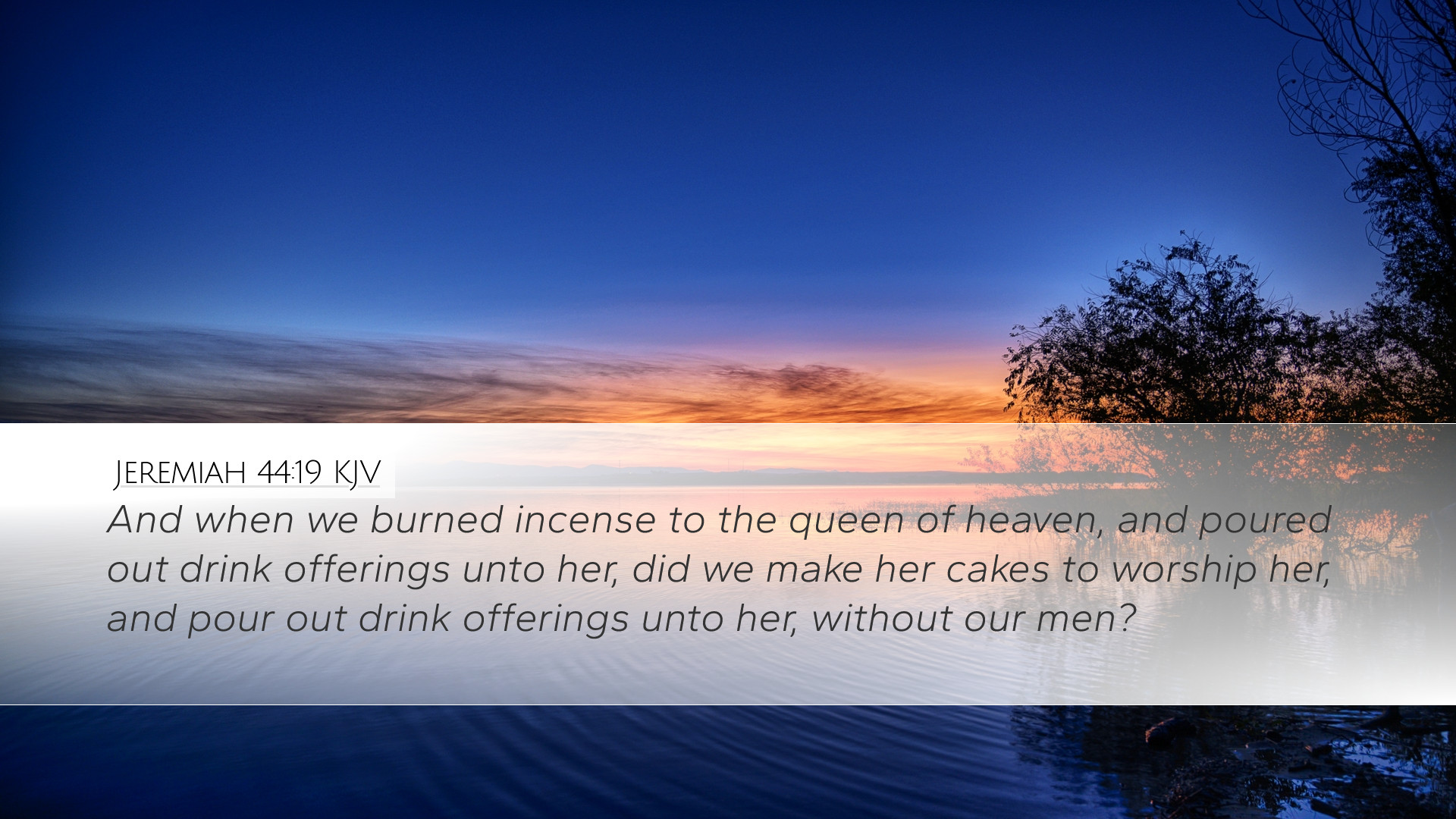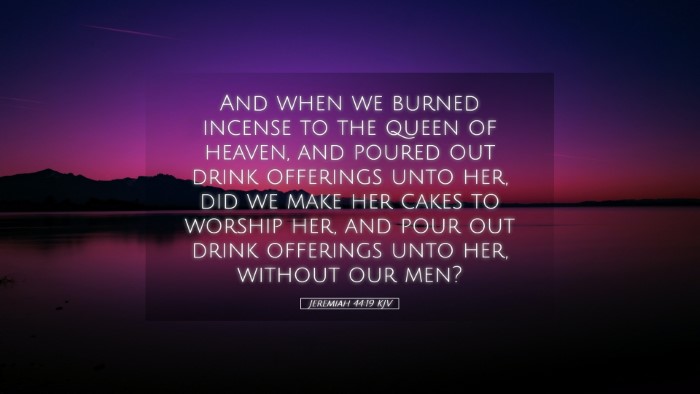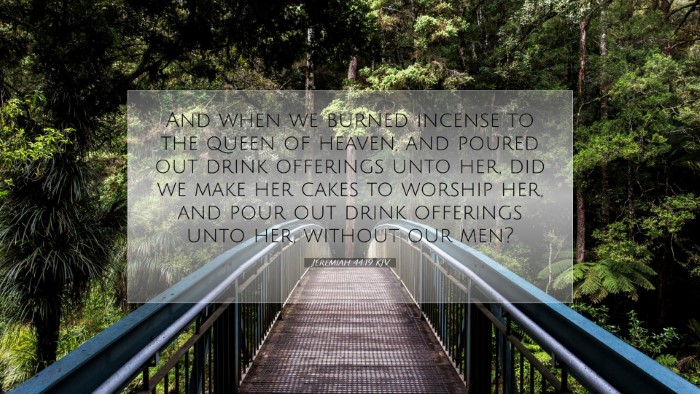Commentary on Jeremiah 44:19
Introduction
The verse under consideration, Jeremiah 44:19, provides a profound insight into the spiritual and communal struggles faced by the people of Judah during their captivity in Egypt. This commentary compiles insights and reflections from renowned public domain scholars including Matthew Henry, Albert Barnes, and Adam Clarke to convey the depth of meaning encapsulated in this brief but impactful verse.
Text of Jeremiah 44:19
"And when we burned incense to the queen of heaven, and poured out drink offerings unto her, did we make her cakes to worship her, without our men?"
Contextual Overview
This verse is situated within a passage where the remnant of Judah, fleeing the calamities of Jerusalem's destruction, turns to idolatrous practices in Egypt. The specific mention of the "queen of heaven" refers to a Canaanite goddess likely associated with fertility and the heavens, which illustrates the influence of surrounding pagan cultures on the Israelites. In this context, the commentary explores how this reflects broader themes of fidelity to God and the consequences of syncretism.
Insights from Matthew Henry
Matthew Henry highlights the irony in the Israelites’ rationale for their idolatry, emphasizing their insistence that their worship had brought them good fortune in the past. He observes:
- Idolatry as a Source of Delusion: Henry notes that the people were "deluded" into thinking that their offerings to the queen of heaven had resulted in blessings such as prosperity and abundant crops, showcasing their lack of understanding of true worship.
- Collective Responsibility: The phrase "without our men" signifies that the women were making decisions independently of male leadership. This aspect of communal worship reveals a deeper societal breakdown and highlights a departure from the covenantal responsibilities outlined in their sacred texts.
Reflections from Albert Barnes
Albert Barnes delves into the implications of bribing God with sacrifices, suggesting that the act of worship itself can become a form of manipulation:
- Misplaced Worship: Barnes elucidates that the Israelites failed to recognize that proper worship involves obedience and recognition of God’s sovereignty, rather than transactional offerings that cater to their cravings for security and prosperity.
- Consequences of Idolatry: Barnes warns of the dangers of idol worship, explaining how it leads to the abandonment of true faith and the eventual judgment that follows. He emphasizes how the people’s decision to burn incense to a false deity represents a critical turning away from the worship of Yahweh.
Commentary by Adam Clarke
Adam Clarke provides a more historical and textual analysis of the verse, particularly focusing on the cultural practices associated with the worship of deities like the queen of heaven:
- Cultural Syncretism: Clarke discusses the blending of Canaanite religious practices with Israelite beliefs, noting that this syncretism led to a hybrid worship that was abhorrent to God. This indicates a tragic loss of identity among the Judeans.
- Rejection of Revelation: He argues that their actions communicate a rejection of the prophetic warnings delivered by Jeremiah, as the people sought comfort in familiar pagan rituals rather than adhering to the covenant established by God.
Theological Implications
The struggle depicted in Jeremiah 44:19 raises several theological implications that are crucial for pastors, students, and scholars:
- Faithfulness in Adversity: The remnant’s turn to idolatry reflects a failure to trust in God during times of personal and communal crisis. This serves as a cautionary tale about the importance of remaining steadfast to one’s faith when faced with difficulties.
- Covenantal Identity: The Israelites’ actions illustrate a departure from their covenant with God. This raises questions about identity and the significance of obedience to divine commandments, even when societal pressures shift.
- Judgment and Grace: The narrative serves as a reminder of the balance between divine judgment and grace. It prompts theologians to reflect on how God’s justice operates alongside His desire for repentance and redemption.
Practical Applications
For contemporary believers and church leaders, the lessons drawn from Jeremiah 44:19 resonate in today’s context:
- Encouraging Authentic Worship: Pastors should foster environments in which congregants feel compelled to worship authentically, recognizing and laying aside distractions that may lead to a shallow faith.
- Community and Accountability: The verse encourages believers to build communities where accountability and leadership are shared, preventing the erosion of spiritual truth and accountability among members.
- Resistance to Cultural Compromise: The need for discernment in cultural engagement is paramount. Believers must resist the temptation to blend societal norms with biblical principles, ensuring that the sanctity of worship remains intact.
Conclusion
Jeremiah 44:19 serves as both a historical reflection and a timeless admonition against idolatry and cultural compromise. The insights provided by Matthew Henry, Albert Barnes, and Adam Clarke collectively underscore the significance of true worship, the dangers of forsaking divine commandments, and the importance of community accountability. For pastors, students, and scholars alike, this passage challenges them to lead lives marked by fidelity to God’s word and to encourage others toward authentic faith expressions in a complex world.


